
views
- Get plenty of sunshine, eat a healthy breakfast, and spend your free time on creative endeavors, people you love, exercise, and planning adventures.
- Manage stress by making a to-do list, handling one thing at a time, and handling urgent problems first; practice mindfulness exercises and take a break for lunch.
- Relax at night with calming classical music and reading; set yourself up for the next day before bed, and give yourself time to get a full night’s rest.
Starting Fresh in the Morning

Sun yourself in the morning. Sunshine helps wake you up, nourishes your body, and improves your mood. While too much sun can damage your skin, too little sun can cause vitamin deficiency and illness. Put on some sunscreen if you are a fair-skinned and head outside in the morning. Take a brisk walk. Eat breakfast outside if the weather permits. Get out of the sun if you feel dehydrated, dizzy, or disoriented. If you are prone to sunburns, stay out of the sun from 10am-3pm, when the sun is strongest.

Display fresh flowers. Fresh flowers relax you and improve your sense of wellbeing. Buy a bouquet or a potted flowering plant. If you have a garden, cut some of your flowers and bring them inside. Buy yourself some flowers on the way to work, and put them in your workplace. If you have a garden, eat where you can see it.

Sit down and enjoy a nutritious breakfast. Take your time when eating in the morning. If you don't wake up hungry, that's okay. Have some coffee, tea, or water, and enjoy your morning until you're ready to eat. When you do eat breakfast, something rich in protein and low in sugar will give you the most energy. Go for protein, whole grains, vegetables, low-fat dairy, fruit, and nuts. Eat egg yolks, leafy greens, cashews, almonds, salmon, sauerkraut, kefir, avocado, or asparagus to reduce any anxiety you may have. For instance, you can make a delicious breakfast of sauerkraut, cold salmon, a poached egg, and avocado whole-grain toast. Blended almond butter, kefir, and peaches make a delicious smoothie. An asparagus and spinach omelet with some yogurt whipped into the eggs will fill you up and taste delicious.
Managing Stress

Write a to-do list. Look over what you have to do, and estimate how much time each task will take. Leave time for breaks in between tasks. Put the things you have to do at the top of your list, and do those things first. Move anything you won't realistically have time for to the next day. Check off tasks as you go! It will give you a sense of satisfaction.

Work on one thing at a time. Multitasking slows you down and can stress you out. To have a good workday, focus on one task at a time. Break down complicated tasks into simple steps, and put each step on your to-do list.

Take care of things that are bothering you immediately. You won't be able to have a good day if there's something you're avoiding thinking about, like an overdue assignment or a talk you had with a friend that made you feel uncomfortable. Finish it today, or make a realistic plan to take care of it eventually. Admitting that something is bothering you will relieve some of your anxiety. Try journaling about things that are stressing you to relieve some of the stress or anxiety. For instance, if you have a big assignment for school that is overdue, be proactive and ask your teacher for more time. If you had a conversation with a friend that is bothering you, take a walk and think about what bothered you. Try to think of what you want to do next: bring it up? Let it go? Get advice from someone else? Decide what's next and then don't dwell on it for the rest of the day.

Be near people who make you happy. Seeing someone you care about, especially if this is someone you hug and are physically affectionate with, will make your day better. Think of the people that always lift your mood—the ones you are always glad to see. Not every friend or loved one will have that effect on you. Make plans with someone who makes you feel happy and safe. If you both have to work, perhaps you could meet for lunch, or work together. Make dinner together and talk about your days. You can go on an adventure, or just catch up over coffee.

Take a lunch break. If you are focused on work, you might not want to pause. However, detaching from work for a while actually improves your focus. You'll get more work done overall, and feel calmer and more focused, if you let go of your thoughts about work during lunch. Get outside and move around if weather permits. Take a walk in a park or other green space. Moving during your breaks won't just make you more productive: it will also help you enjoy your day.
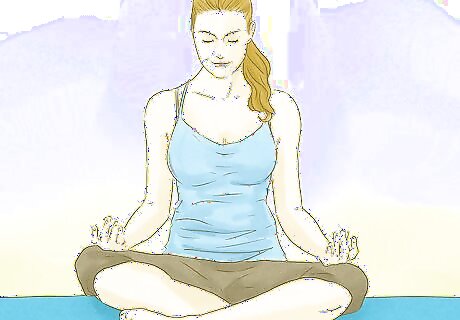
Do mindfulness exercises. During your lunch break, or when you have short breaks during the workday, take some time to slow your thinking. These exercises are even more effective for productivity than taking a walk. Take a moment to notice what all your senses are up to. Notice what you are seeing, touching, smelling, tasting, and hearing. Slow your breathing for a few minutes. If you are breathing quickly, try to breathe slowly and deeply. Breathe deeply from your belly, and release the breath slowly. Tense and relax your muscles, one set at a time. Start with your toes and move upward. Try to think only about your muscles as you go.
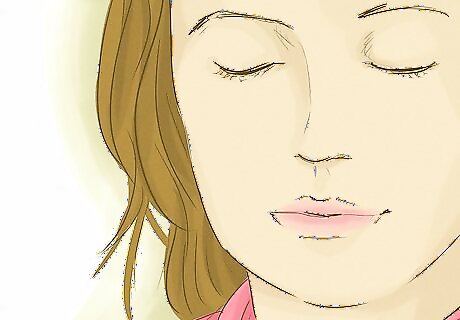
Let go of negative thoughts. If you are struggling to concentrate, pause to ask yourself what is on your mind. Is there a worry that is causing you distress? If it's baseless, take a moment to gently acknowledge it, then release it. You might say to yourself, "I cannot do anything about that now," or "That is not a problem for me." If it's something you do need to address, write it down in your calendar as a task to be completed at a particular time. If it is something that cannot be solved now, consider journaling about it and then turning your attention to a different task.
Making the Most of Free Time

Plan an excursion if you can. If you have a day off, do something special you don't normally get to do. Go to a museum, visit an out of the way restaurant, go apple picking, or visit a local landmark you've never seen. Opt for doing something new rather than buying something new. Experiences enrich your day in a way that purchases cannot.

Do a favor for someone you love. Think of someone who is going through a hard time, and offer to perform an act of kindness, such as giving them a ride, picking up their groceries, or mowing their lawn.

Spend time on creative endeavors. Spend time with the creative work that brings you joy. You might bake, cook, sing, sew, dance, or write. Don't get hung up on making the perfect thing: let yourself play around and experiment. Drawing, doodling, and even coloring will make you feel happier. You can do these creative activities by hand or via apps.

Exercise. Exercise makes you feel better. It eases depression and anxiety. Find a way of exercising that you enjoy, such as biking, taking a brisk walk, dancing, or swimming. Exercise will help you enjoy the rest of your day. Being in natural spaces also makes you feel good. Take some time to walk outside. Try taking a hike, walking near a body of water, or strolling through a park or garden.
Relaxing at Night
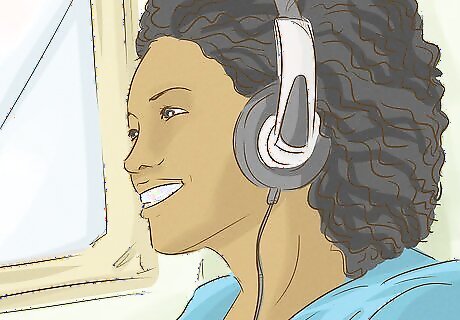
Calm down with relaxing classical music. Classical compositions that follow a consistent 10-second rhythm actually slow your heart rate, lowering your blood pressure and helping you feel calm. Some examples include: "Va Pensiero" by Giuseppe Verdi "Nessun Dorma" by Giacomo Puccini "Symphony 9, 3rd movement" by Ludwig van Beethoven

Read. Reading helps you relax and enjoy your day. Read something on paper instead of on a screen. You'll be able to focus better, and you'll take in more information. Consider reading a novel, a book of poetry, a graphic novel, or a YA novel. Let yourself be lost in the text. Try to avoid other activities while you read. Instead of listening to music or snacking at the same time, just focus on the words. If you're not much of a reader, that's okay! The reason reading is relaxing is actually because it takes so much of our concentration: it helps us focus on something other than our own concerns.
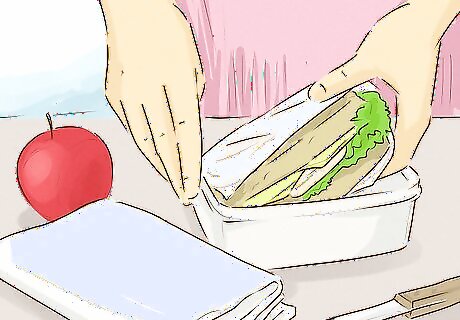
Wind down so you can go to bed on a peaceful note. Before bedtime, set yourself up for the next day. Set out your outfit, set your alarm if you are using one, and pack a lunch when needed. This way, your next morning will be leisurely. After you've done this, put aside any thoughts of work. Focus on winding down for the night. Turn off your phone if you can. If you watch TV in the evening, watch something calming, like a gentle comedy, or a children's cartoon such as "Steven Universe" or "My Neighbor Totoro." Never go to bed immediately after experiencing a strong negative feeling, having a big fight, or experiencing something frightening or upsetting. Sleeping encodes memories, so bad feelings will make a longer-lasting impression on you if you sleep on them.
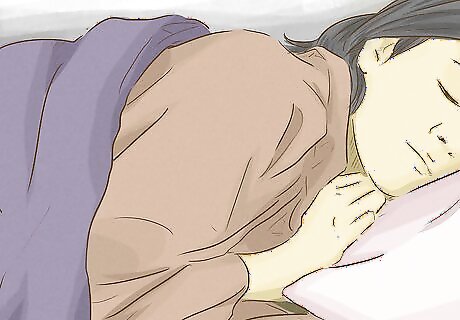
Set yourself up to sleep through the night. Nothing improves your mood like being properly rested. Adults need 7-8 hours of sleep a night, while teens need 9-11 hours. To sleep through the night, sleep in a dark, quiet room. Use the bathroom before you fall asleep to increase your chances of sleeping through the night. If you have the morning off, wake up without an alarm. Your body will rest better that way. With a good night's sleep, you're all set to have a good day tomorrow, too.














Comments
0 comment